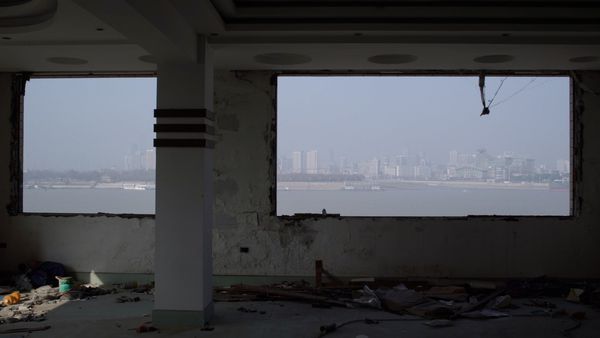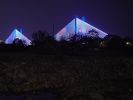Eye For Film >> Movies >> A River Runs, Turns, Erases, Replaces (2021) Film Review
A River Runs, Turns, Erases, Replaces
Reviewed by: Mateusz Tarwacki

Wuhan means “River City”, so it's no wonder that the river, which is the symbol of the city, plays such an important role in Shengze Zhu's latest film, A River Runs, Turns, Erases, Replaces. One gets the impression that the river is the spirit of this place, the centre, dividing it into two parts, and the dynamic mirror of memory – it is the river that sets the rhythm of the city's life, that is witness of the passage of time, capable of giving, but also taking away. It’s heart was still beating when the city was paralysed by the Covid pandemic that would spread throughout the world from there. The director, who herself comes from Wuhan, pays poetic tribute to both the place and its inhabitants, disenchanting the horror through which the world learned to look at the city on the Yangtze River.
But the Chinese director's film is not only a compliment to the place – it is also a keen observation of social changes, a distanced look that goes beyond the perspective that is limited by time. After all, time flows differently for the river. Zhu mixes the past, present and vision of the future in a new, strange, anti-social, empty world. The world after the apocalypse, after the pandemic. How strange it seems to contrast empty, monumental streets of a big city with a crowd of people who, standing on the other bank, await a lights switch-on – illuminating the sky and water in a neon blaze of colours.

The symbolism of the river is extremely rich and precisely used by the documentary filmmaker. After all, the river is a kind of border that separates the past from the future, the real world from the afterlife. Undoubtedly, it acquires a mystical function when letters written by family members to relatives who died during a pandemic appear on the screen, in stunning beautiful, riverside shots. For those people, the Yangtze became the Styx River, through which, due to radical restrictions, they could not pass to say goodbye to their relatives dying on the other side.
Although to a large extent the movie uses CCTV footage, it is well-edited, and maybe just thanks to the footage, the points where the camera is set up are not obvious, and the shots are original and inventive. One can see the sensitivity with which the director approaches her place of origin – as if she was trying to heal the trauma of the last dozen or so months by just portraying the place. With similar subtlety she criticises radical quarantine in a slow and silent narrative, simply allowing trauma and regret to echo through.
Now living in Chicago, Zhu maintains a bond with her Wuhan roots, harmoniously linking the image of the city of her youth with the image of a river that is still something greater than a human being. Although the elegising tone of the film will not captivate everyone with its slow flow, sometimes one can allow oneself to drift slowly through the river of cinema.
Reviewed on: 03 Mar 2021















